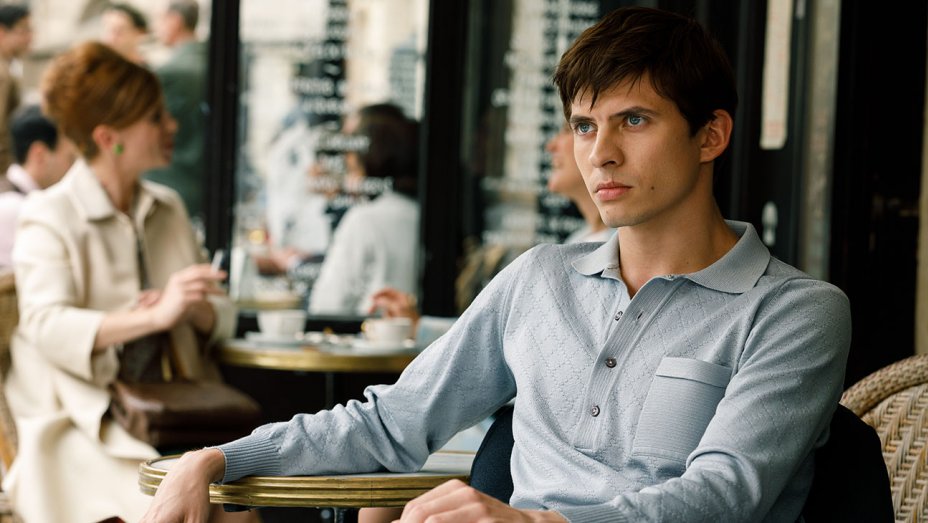
Dir: Ralph Fiennes | Writer: David Hare | Cast: Oleg Ivenko, Adele Exarchopoulos, Ralph Fiennes, Raphael Peronnaz, Chulpan Khamatova, Sergei Polunin, Calypso Valois, Louis Hoffman, Olivier Rabourdin | UK | Biopic Drama | 122′
Ralph Fiennes’ third feature – in which he also stars – is an ambitious and classically-styled biopic of the Russian ballet legend Rudolf Nureyev’s defection to the West in 1961.
Quite why David Hare decided on a fractured narrative to tell the maverick Russian dancer’s life is not clear. And it certainly doesn’t intensify the storyline. The dancer’s life had so much dramatic heft that a straightforward chronicle would have seen it steaming ahead rather than shunting occasionally into the sidings. Drama is also provided by the sheer verve of Nureyev himself as played by professional dancer Oleg Ivenko in an extraordinary screen debut as one of the 20th century’s most celebrated dancers whose rise to fame was justified by his remarkable talent and legendary status. At the helm, Ralph Fiennes captures the zeitgeist and stultifying atmosphere of a Soviet Russia still languishing behind the Iron Curtain. He also conveys the elegantly sleek conservatism of France during the 1960s. France may have invented ballet but the East provides the energy and gusto and this comes through in Ivenko’s ballet sequences that echo the spirit of Nureyev and enliven this graceful but sober drama. Fiennes’s performance as ballet master Alexander Pushkin is immaculate and exudes a calm dignity that is delightful to watch, he also appears to be proficient in Russian. This together with a strong support cast and mise en scène more than compensate for the flawed narrative structure. Adèle Exarchopoulos brings allure and intensity to her rather buttoned down role as Chilean heiress Clara Saint, who announced herself as a friend of André Malraux, and who comes to Nureyev rescue in the final scenes. And Olivier Rabourdin (Taken) makes for a mesmerising chief of Police during the heart-pounding denouement at Le Bourget Airport in Paris when Nureyev dramatically claims political asylum.
Those from incredibly harsh beginnings with nothing to lose often rise to fame and fortune. And Nureyev was no exception. We are appraised of his background in the film’s early scenes where his mother gives birth to him on a train in Siberia in 1938. But despite his remarkable talent as a dancer it was unlikely that he would ever have made it to the international stage without his ego, utter determination and bloodymindedness, showcased to ample and often darkly humorous effect in The White Crow, along with his cultural voraciousness: once in Paris he devours every bit of local culture he can lay his hands on from the Louvre to the Follies Bergères. Wilful in the extreme, he ignores his superiors, rails against everyone in authority and no Westerner seems to bat an eyelid in letting him have his way, with the exception of Clara who stares him down in icy disdain after a restaurant debacle. But his communist ‘handlers’ still shadow him everywhere (and this still happens today in communist China) and his wilfulness leads to him not being allowed to dance on opening night in the Champs Elysees theatre.
On a tour stop in Moscow with a local ballet company, Nureyev auditions for the Bolshoi and gets in but then picks holes in their classical techniques, decided to try instead for the Mariinsky Ballet school in St Petersburg where he becomes a protegé of Alexander Pushkin, the eminence grise of the Vaganova Academy of Russian Ballet. Pushkin invites him to stay in the apartment he shares with his wife, who discovers the only way to disarm the young man’s insolence. All in all this is an accomplished and entertaining arthouse drama and hopefully lead to Fiennes handing the script of his next film as well as the direction. MT
SCREENING NATIONWIDE 7 April 2019